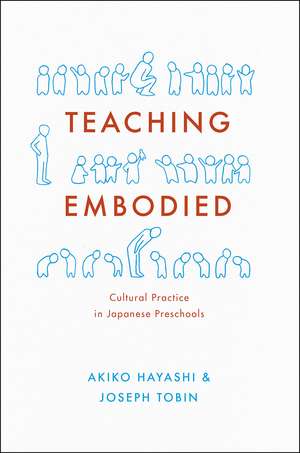Teaching Embodied: Cultural Practice in Japanese Preschools
Autor Akiko Hayashi, Joseph Tobinen Limba Engleză Hardback – 17 aug 2015
When we look beyond lesson planning and curricula—those explicit facets that comprise so much of our discussion about education—we remember that teaching is an inherently social activity, shaped by a rich array of implicit habits, comportments, and ways of communicating. This is as true in the United States as it is in Japan, where Akiko Hayashi and Joseph Tobin have long studied early education from a cross-cultural perspective. Taking readers inside the classrooms of Japanese preschools, Teaching Embodied explores the everyday, implicit behaviors that form a crucially important—but grossly understudied—aspect of educational practice.
Akiko Hayashi and Joseph Tobin embed themselves in the classrooms of three different teachers at three different schools to examine how teachers act, think, and talk. Drawing on extended interviews, their own real-time observations, and hours of video footage, they focus on how teachers embody their lessons: how they use their hands to gesture, comfort, or discipline; how they direct their posture, gaze, or physical location to indicate degrees of attention; and how they use the tone of their voice to communicate empathy, frustration, disapproval, or enthusiasm. Comparing teachers across schools and over time, they offer an illuminating analysis of the gestures that comprise a total body language, something that, while hardly ever explicitly discussed, the teachers all share to a remarkable degree. Showcasing the tremendous importance of—and dearth of attention to—this body language, they offer a powerful new inroad into educational study and practice, a deeper understanding of how teaching actually works, no matter what culture or country it is being practiced in.
Akiko Hayashi and Joseph Tobin embed themselves in the classrooms of three different teachers at three different schools to examine how teachers act, think, and talk. Drawing on extended interviews, their own real-time observations, and hours of video footage, they focus on how teachers embody their lessons: how they use their hands to gesture, comfort, or discipline; how they direct their posture, gaze, or physical location to indicate degrees of attention; and how they use the tone of their voice to communicate empathy, frustration, disapproval, or enthusiasm. Comparing teachers across schools and over time, they offer an illuminating analysis of the gestures that comprise a total body language, something that, while hardly ever explicitly discussed, the teachers all share to a remarkable degree. Showcasing the tremendous importance of—and dearth of attention to—this body language, they offer a powerful new inroad into educational study and practice, a deeper understanding of how teaching actually works, no matter what culture or country it is being practiced in.
Preț: 608.28 lei
Preț vechi: 789.97 lei
-23% Nou
Puncte Express: 912
Preț estimativ în valută:
116.41€ • 120.26$ • 96.88£
116.41€ • 120.26$ • 96.88£
Carte tipărită la comandă
Livrare economică 26 martie-09 aprilie
Preluare comenzi: 021 569.72.76
Specificații
ISBN-13: 9780226263076
ISBN-10: 022626307X
Pagini: 224
Ilustrații: 189 halftones
Dimensiuni: 152 x 229 x 18 mm
Greutate: 0.41 kg
Ediția:1
Editura: University of Chicago Press
Colecția University of Chicago Press
ISBN-10: 022626307X
Pagini: 224
Ilustrații: 189 halftones
Dimensiuni: 152 x 229 x 18 mm
Greutate: 0.41 kg
Ediția:1
Editura: University of Chicago Press
Colecția University of Chicago Press
Notă biografică
Akiko Hayashi is a postdoctoral fellow in education at the University of Georgia. Joseph Tobin is professor of early childhood education at the University of Georgia and the author of several books, including Preschool in Three Cultures Revisited, also published by the University of Chicago Press.
Recenzii
“As someone who has spent twenty years living and working in Japan, both as a teacher of English and student of Japanese culture, and had the opportunity to work in kindergartens and nursery schools in both cultures, I found the descriptions in Teaching Embodied captivating and full of cultural insight. The Japanese government wisely sent out emissaries to the rest of the world in order to bring back knowledge to develop the nation after the Meiji Restoration in the late nineteenth century. America could also learn much from the Japanese regarding the implementation of an educational system that nurtures the development of sensitivity and consideration of others. This extremely important work is highly recommended for those interested in gaining a more in depth understanding of the Japanese and their culture, but also anyone involved in child development and education.”
“Even readers unfamiliar with the prior comparative studies will find this volume engaging and enlightening on the topics of teaching and of cultural practice.”
“Education is one of the most parochial of all disciplines, and early childhood education practices are perhaps the most insulated of all. Accordingly, this examination of teaching in learning in Japanese preschools by Hayashi and Tobin (both, Univ. of Georgia) is especially welcome. Examining how Japanese preschool teachers act, talk, and think, Teaching Embodied closely follows three practitioners and is based upon extended observations, interviews, and analysis of video recordings of classroom behaviors. As a result of this detail, the reader is provided an unparalleled understanding of and appreciation for the practices of Japanese preschool teachers. Organized into seven chapters, the book explores mimamoru (teaching by watching and waiting), the pedagogy of feelings, the pedagogy of peripheral participation, learning embodied culture, expertise, early childhood education policy as a cultural practice, and the notion of reassembling the cultural. The book assists readers in thinking about the practices common in preschool settings and imagining alternative ways of doing things. Rich with photographs, anecdotes, and examples of practice, the book provides a marvelous complement to Carol Anne Wien's Emergent Curriculum in the Primary Classroom: Interpreting the Reggio Emilia Approach in Schools. . . . Highly recommended.”
“Even for those without children, Teaching Embodied offers cultural insights that explain many fascinating details of Japan’s group society.”
